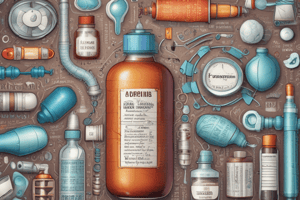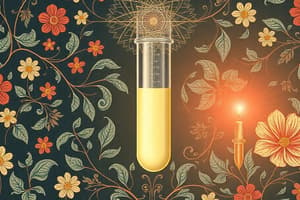Podcast
Questions and Answers
Quelles sont les trois sortes d'insulines selon leur durée d'action?
Quelles sont les trois sortes d'insulines selon leur durée d'action?
- Insulines à action rapide, intermédiaire et lente (correct)
- Insulines à action lente, modérée et rapide
- Insulines à action prolongée, semi-lentes et rapides
- Insulines rapides, à libération prolongée et instantanées
Quelles insulines contiennent le plus d'impuretés?
Quelles insulines contiennent le plus d'impuretés?
- Insulines synthétiques
- Insulines identiques à l'insuline humaine
- Insulines traditionnelles d'origine bovine ou porcine (correct)
- Insulines monocomposées
Quelle méthode n'est pas utilisée pour obtenir des insulines identiques à l'insuline humaine?
Quelle méthode n'est pas utilisée pour obtenir des insulines identiques à l'insuline humaine?
- Génie génétique
- Hémi-synthèse à partir d'insuline porcine
- Synthèse chimique
- Extraction à partir de pancréas bovin (correct)
Quel effet indésirable n'est pas directement lié à un mauvais contrôle de l'équilibre glycémique?
Quel effet indésirable n'est pas directement lié à un mauvais contrôle de l'équilibre glycémique?
Quelle est une indication pour l'utilisation de l'insuline ?
Quelle est une indication pour l'utilisation de l'insuline ?
Quel effet indésirable est associé au Chlorpropamide (DIABINESE®) ?
Quel effet indésirable est associé au Chlorpropamide (DIABINESE®) ?
Quel mécanisme d'action est associé aux sulfamides hypoglycémiants ?
Quel mécanisme d'action est associé aux sulfamides hypoglycémiants ?
Quelle est la voie principale d'élimination des sulfamides hypoglycémiants ?
Quelle est la voie principale d'élimination des sulfamides hypoglycémiants ?
Quel est un risque lié à un surdosage de sulfamides hypoglycémiants ?
Quel est un risque lié à un surdosage de sulfamides hypoglycémiants ?
Quel est le temps d'action maximum de l'insuline neutre humaine UMULINE RAPIDE® ?
Quel est le temps d'action maximum de l'insuline neutre humaine UMULINE RAPIDE® ?
Quelle insuline à action prolongée nécessite un temps de latence de 4 à 5 heures ?
Quelle insuline à action prolongée nécessite un temps de latence de 4 à 5 heures ?
Quel facteur n'affecte pas la pharmacocinétique de l'insuline ?
Quel facteur n'affecte pas la pharmacocinétique de l'insuline ?
Quel est l'effet de l'insuffisance hépatique ou rénale sur l'effet hypoglycémiant de l'insuline ?
Quel est l'effet de l'insuffisance hépatique ou rénale sur l'effet hypoglycémiant de l'insuline ?
Quel est le temps d'action d'un analogue ultra-rapide comme l'insuline Lispro (HUMALOG®) ?
Quel est le temps d'action d'un analogue ultra-rapide comme l'insuline Lispro (HUMALOG®) ?
Quel est le rôle principal de l'insuline dans le métabolisme glucidique?
Quel est le rôle principal de l'insuline dans le métabolisme glucidique?
Comment l'insuline affecte-t-elle le métabolisme lipidique?
Comment l'insuline affecte-t-elle le métabolisme lipidique?
Quel est un effet de l'insuline sur les acides aminés dans les cellules?
Quel est un effet de l'insuline sur les acides aminés dans les cellules?
Comment l'insuline est-elle administrée principalement?
Comment l'insuline est-elle administrée principalement?
Quelle est la durée de l'effet hypoglycémiant de l'insuline après une injection IV unique?
Quelle est la durée de l'effet hypoglycémiant de l'insuline après une injection IV unique?
Quelle est une conséquence de l'administration d'insuline dans le traitement des hyperkaliémies?
Quelle est une conséquence de l'administration d'insuline dans le traitement des hyperkaliémies?
Quel est le précurseur de l'insuline sécrété par les cellules β?
Quel est le précurseur de l'insuline sécrété par les cellules β?
Comment l'insuline est-elle détruite dans l'organisme?
Comment l'insuline est-elle détruite dans l'organisme?
Quel est l'objectif principal du traitement du diabète?
Quel est l'objectif principal du traitement du diabète?
Le diabète de type I est caractérisé par:
Le diabète de type I est caractérisé par:
Quel facteur contribue à l'hyperglycémie dans le diabète de type II?
Quel facteur contribue à l'hyperglycémie dans le diabète de type II?
Qu'est-ce qui définit l'insuline?
Qu'est-ce qui définit l'insuline?
Quelle est une caractéristique du diabète de type II?
Quelle est une caractéristique du diabète de type II?
Quel est le poids moléculaire de l'insuline?
Quel est le poids moléculaire de l'insuline?
Quelles sont les chaînes qui constituent l'insuline?
Quelles sont les chaînes qui constituent l'insuline?
Qu'est-ce qui n'est pas une cause de l'hyperglycémie?
Qu'est-ce qui n'est pas une cause de l'hyperglycémie?
Quel est un effet indésirable associé à la prise de metformine ?
Quel est un effet indésirable associé à la prise de metformine ?
Quel mécanisme d'action la metformine n'implique-t-elle pas ?
Quel mécanisme d'action la metformine n'implique-t-elle pas ?
Quel état constitue une contre-indication à l'utilisation de la metformine ?
Quel état constitue une contre-indication à l'utilisation de la metformine ?
Quel est l'impact des β-bloquants lorsqu'ils sont combinés avec la metformine ?
Quel est l'impact des β-bloquants lorsqu'ils sont combinés avec la metformine ?
Quelle affirmation concernant la pharmacocinétique de la metformine est correcte ?
Quelle affirmation concernant la pharmacocinétique de la metformine est correcte ?
Lors d'une intervention chirurgicale, que doit-on faire avec la metformine ?
Lors d'une intervention chirurgicale, que doit-on faire avec la metformine ?
Quel facteur pourrait favoriser l'acidose lactique en association avec la metformine ?
Quel facteur pourrait favoriser l'acidose lactique en association avec la metformine ?
Quel type de diabète représente une contre-indication à l'utilisation de la metformine ?
Quel type de diabète représente une contre-indication à l'utilisation de la metformine ?
Flashcards
Diabète de type 1 (DID)
Diabète de type 1 (DID)
Le diabète de type 1, aussi appelé diabète insulinodépendant (DID), est causé par une destruction des cellules bêta du pancréas, responsables de la production d'insuline. Cette destruction est souvent due à des facteurs génétiques, des phénomènes auto-immuns et des infections virales. Il s'agit d'une carence absolue en insuline.
Diabète de type 2 (DNID)
Diabète de type 2 (DNID)
Le diabète de type 2, aussi appelé diabète non insulinodépendant (DNID), est une maladie complexe influencée par plusieurs facteurs, notamment des facteurs génétiques, environnementaux et l'obésité. Il se caractérise par une résistance à l'insuline, ce qui signifie que l'insuline ne peut pas bien fonctionner dans le corps.
Hyperglycémie et dysfonctionnement de l'insuline
Hyperglycémie et dysfonctionnement de l'insuline
Une hyperglycémie (taux de sucre élevé dans le sang) est toujours liée à un dysfonctionnement de l'insuline. Cela peut être dû à une production insuffisante d'insuline, une résistance à l'insuline ou une production d'insuline de qualité inférieure.
L'insuline
L'insuline
Signup and view all the flashcards
Le traitement du diabète
Le traitement du diabète
Signup and view all the flashcards
Objectifs à court terme du traitement du diabète
Objectifs à court terme du traitement du diabète
Signup and view all the flashcards
Objectifs à long terme du traitement du diabète
Objectifs à long terme du traitement du diabète
Signup and view all the flashcards
Médicaments antidiabétiques
Médicaments antidiabétiques
Signup and view all the flashcards
Dégradation et élimination de l'insuline
Dégradation et élimination de l'insuline
Signup and view all the flashcards
Effet de l'insuffisance hépatique et/ou rénale
Effet de l'insuffisance hépatique et/ou rénale
Signup and view all the flashcards
Effet de la grossesse sur l'insuline
Effet de la grossesse sur l'insuline
Signup and view all the flashcards
Temps de latence de l'insuline
Temps de latence de l'insuline
Signup and view all the flashcards
Durée d'action de l'insuline
Durée d'action de l'insuline
Signup and view all the flashcards
Passage des médicaments hypoglycémiants à travers la barrière placentaire
Passage des médicaments hypoglycémiants à travers la barrière placentaire
Signup and view all the flashcards
Effets indésirables de l'insuline
Effets indésirables de l'insuline
Signup and view all the flashcards
Différentes formes d'insuline
Différentes formes d'insuline
Signup and view all the flashcards
Lipodystrophies liées à l'insuline
Lipodystrophies liées à l'insuline
Signup and view all the flashcards
Contre-indications de l'insulinothérapie
Contre-indications de l'insulinothérapie
Signup and view all the flashcards
Transformation de la proinsuline en insuline
Transformation de la proinsuline en insuline
Signup and view all the flashcards
Modification de l'insuline pour prolonger sa durée d'action
Modification de l'insuline pour prolonger sa durée d'action
Signup and view all the flashcards
Sources d'insuline
Sources d'insuline
Signup and view all the flashcards
Dégradation de l'insuline
Dégradation de l'insuline
Signup and view all the flashcards
Voies d'administration de l'insuline
Voies d'administration de l'insuline
Signup and view all the flashcards
Effets de l'insuline sur le métabolisme
Effets de l'insuline sur le métabolisme
Signup and view all the flashcards
Effets de l'insuline sur le métabolisme des glucides
Effets de l'insuline sur le métabolisme des glucides
Signup and view all the flashcards
Effets de l'insuline sur le métabolisme des lipides
Effets de l'insuline sur le métabolisme des lipides
Signup and view all the flashcards
Sulfamides hypoglycémiants
Sulfamides hypoglycémiants
Signup and view all the flashcards
Glibenclamide
Glibenclamide
Signup and view all the flashcards
Chlorpropamide
Chlorpropamide
Signup and view all the flashcards
Effets indésirables des sulfamides hypoglycémiants
Effets indésirables des sulfamides hypoglycémiants
Signup and view all the flashcards
Indications des sulfamides hypoglycémiants
Indications des sulfamides hypoglycémiants
Signup and view all the flashcards
La metformine
La metformine
Signup and view all the flashcards
Mécanisme d'action de la metformine
Mécanisme d'action de la metformine
Signup and view all the flashcards
Pharmacocinétique de la metformine
Pharmacocinétique de la metformine
Signup and view all the flashcards
Effets indésirables de la metformine
Effets indésirables de la metformine
Signup and view all the flashcards
Acidose lactique et metformine
Acidose lactique et metformine
Signup and view all the flashcards
Contre-indications à la metformine
Contre-indications à la metformine
Signup and view all the flashcards
Metformine avant intervention
Metformine avant intervention
Signup and view all the flashcards
Biguanides
Biguanides
Signup and view all the flashcards
Study Notes
Introduction to Diabetes Medications
-
The goals of diabetes treatment include:
- Reducing short-term hyperglycemia complications (thirst, frequent urination, weight loss, increased hunger, and diabetic ketoacidosis).
- Preventing long-term complications (cardiovascular, neurological, eye, kidney, and digestive problems).
-
Diabetes treatment is a chronic condition.
-
Several classes of antidiabetic medications exist.
-
Insulin was discovered approximately 30 years ago.
-
Sulfonylureas, biguanides, and newer antidiabetic molecules are other types of medications.
-
The role of new antidiabetic molecules in type II diabetes treatment is still under discussion.
Physiology of Diabetes
- Hyperglycemia is always linked to a defect in insulin function:
- Insufficient insulin secretion.
- Impaired insulin action (insulin resistance).
- Abnormal insulin quality.
Type 1 Diabetes (Insulin-Dependent Diabetes)
- Type 1 diabetes (DID) involves genetic predisposition and auto-immune phenomena.
- This condition is also associated with certain viruses.
- Diabetes develops when 80-90% of the beta cells are destroyed.
- Treatment focuses on insulin replacement therapy to mimic normal insulin secretion.
Type 2 Diabetes (Non-Insulin-Dependent Diabetes)
- Type 2 diabetes (DNID) is a multifaceted condition influenced by:
- Genetic factors
- Environmental factors
- Obesity
- Hyperglycemia in type 2 diabetes is a result of:
- Impaired insulin secretion
- Reduced insulin effectiveness on target tissues (insulin resistance)
- Increased hepatic glucose production.
Insulin
- Insulin is the body's only hypoglycemic hormone.
- It's produced by beta cells in the islets of Langerhans in the pancreas.
- Insulin is a polypeptide (molecular weight: 60,000) with two chains (α and β) connected by disulfide bonds.
- Proinsulin, an inactive precursor, is secreted by beta cells and subsequently processed to form active insulin.
- Insulin can be polymerized with zinc and proteins (protamine), extracted from animal pancreases (potential impurities and allergies), or produced using genetic engineering.
- Insulin is broken down by digestive enzymes, hence its requirement for parenteral administration (subcutaneous, intramuscular, or intravenous).
Insulin: Pharmacological Properties
- Insulin affects carbohydrate, fat, and protein metabolism.
- Carbohydrates: Hypoglycemia by combined hepatic and peripheral action (liver and peripheral cells like muscle and adipose tissues).
- Fats: Increased endogenous triglyceride synthesis.
- Proteins: Increased amino acid uptake and protein synthesis.
- Potassium: Increased potassium uptake into the cells (used to treat hyperkalemia).
Insulin: Pharmacokinetics
- IV administration leads to immediate hypoglycemic effects lasting only a short period (less than one hour).
- Subcutaneous administration has delayed onset (30 minutes), but the duration of action is longer (around 6-8 hours).
- Insulin degradation occurs primarily in the liver (40%) and kidneys, with increased hypoglycemic effects in cases of liver or kidney impairment.
- Certain factors like pregnancy (placental destruction), and medications like aspirin, MAOIs, and beta-blockers can impact insulin pharmacokinetics, reducing or changing its action.
- Alcohol can reduce glycogenolysis and affect insulin clearance.
Insulin: Forms and Types
- Insulin is categorized by its duration of action: rapid-acting, intermediate-acting (or semi-long-acting), and long-acting.
- Different forms arise from differing purification levels. Traditional forms (bovine or porcine) are less pure than newer forms (human or more highly purified animal forms). More recently, insulins identical to human insulin are available, made by either semisynthesis or genetic engineering.
Insulin: Side Effects
- Hypoglycemia : linked to poor blood sugar control (risk of severe hypoglycemia).
- Hypokalemia:
- Lipodystrophy : abnormal fat tissue deposits at injection sites.
- Allergic reactions (less common for human-identical insulins).
- Insulin therapy needs careful consideration.
Insulin: Indications
- Absolute insulin deficiency (Type 1 diabetes) .
- Pregnancy.
- Certain situations in type 2 diabetes, like infections, surgery, or retinopathy or neuropathy complications.
Sulfonylureas (SH)
- Chemicals: specific types (e.g. glibenclamide, carbutamide).
- Mechanism of action: stimulate the release of endogenous insulin from beta cells.
- Effects: increase in appetite
- Pharmacokinetics: Oral absorption, hepatic metabolism, renal elimination. They bind to plasma proteins.
- Side effects: Risk of hypoglycemia, specific side effects (e.g., pruritus, urticaria, jaundice, agranulocytosis, Lyell syndrome) in some cases. Can be teratogenic.
- Contraindications: include cases with insulin-dependent diabetes, diabetic ketoacidosis, pregnancy, and renal failure.
Biguanides
- Biguanides are often used in diabetes.
- Example: Metformin (Glucophage).
- Metformin is a strong base, leading to gastrointestinal issues.
- Mechanism of action: It does not influence insulin secretion but instead primarily affects hepatic glucose production (inhibiting glycogenolysis and gluconeogenesis) and intestinal glucose absorption. It often increases glucose uptake in peripheral tissues.
- Pharmacokinetics: Oral absorption (slow), minimal plasma protein binding, and predominantly renal elimination.
- Side effects: nausea, vomiting, diarrhea, and lactic acidosis (especially in patients with compromised kidney function or other risk factors).
- Contraindications: Those with renal impairment, alcoholism, pregnancy, or conditions that increase the risk of lactic acidosis (such as fasting, ketoacidosis, or hypoxia). Usage should be stopped around surgery with contrast agents for 3 days.
Studying That Suits You
Use AI to generate personalized quizzes and flashcards to suit your learning preferences.




